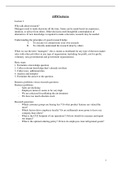Samenvatting
Summary of the Lectures for Advances Research Methods
- Instelling
- Erasmus Universiteit Rotterdam (EUR)
Summary of the contents of the lectures for Advances Research Methods (ARM) at RSM bachelor Business Administration / Bedrijfskunde.
[Meer zien]




